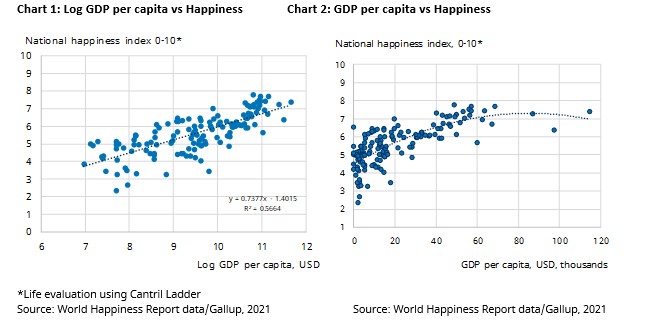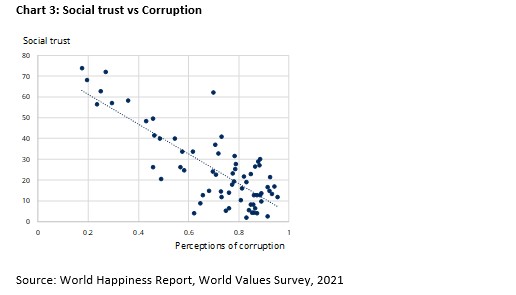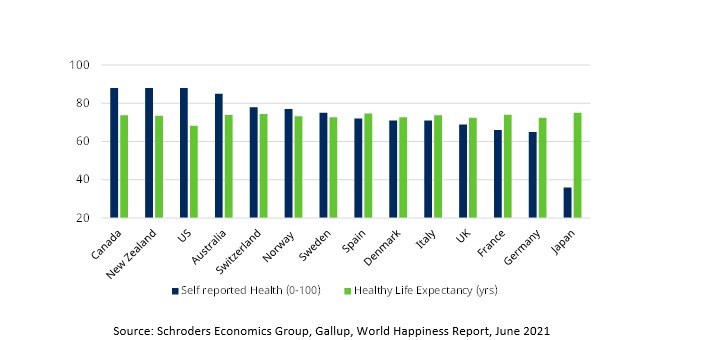A gratitude journal helped me through the Covid-19 lockdowns last year. Every day I would write down three things that I appreciated in my life. This allowed me to reflect on what made me happy, writes Piya Sachdeva, economist at Schroders.
The things that make me happiest tend to be those money cannot buy. This goes against everything I have been taught in my career as an economist, where Gross Domestic Product (GDP) as a monetary value of an economy, is the main measure of societal performance. I should only be as happy as the material things I own.
The case for retiring GDP in favour of wellbeing has gained traction alongside the rise in the number of investors considering social factors. And figuring out what makes society happy helps us identify the risks to the global economy from the ‘S’ in ‘ESG’.
Money can buy happiness, but only up to a point
GDP per person has a strong relationship with national happiness, explaining 56% of the differences across countries (see chart 1). But the richer someone is, the smaller the boost in happiness from becoming richer. Happiness plateaus as the average income in society reaches $70,000 (see chart 2).
Chart 1: Log GDP per capita vs Happiness Chart 2: GDP per capita vs Happiness

What else matters?
The Organisation for Economic Co-operation and Development (OECD) was one of the first international bodies to bring together internationally comparable measures of wellbeing under its Better Life Index.
But some things matter more than others when it comes to driving wellbeing. To explore this, we use regression analysis to explore what objective social factors best explain subjective happiness, measured by life satisfaction. Four factors stand out as having the strongest relationship with happiness. These are personal income, long-term unemployment, self-perceived health and perceived corruption.
Corruption erodes social trust
Investors have long considered corruption and wider governance measures as important. The perception of corruption data that we use in our work is in fact a measure of institutional trust, which captures both government and business corruption. More specifically, survey respondents to a questionnaire carried out by Gallop are asked whether corruption is widespread in government and business? This also has a good relationship with broader trust in society, where people are asked whether they can trust others (see chart 3).
Chart 3: Social trust vs Corruption

It is no surprise that emerging markets have higher perceptions of corruption than developed markets. Within developed markets, the Nordic countries have the lowest perception of corruption and highest social trust levels. This helps to explain why these countries consistently rank as some of the happiest in the world.
Mental health counts
Unsurprisingly, health has a strong relationship with happiness, and it is a theme that popped up in my journal several times.
The measure we use is self-reported health – the share of those reporting “at least good” health. Importantly, this reflects that self assessed health combines both mental and physical health. Mental health is especially important to consider in advanced economies, where life expectancy and other measures of physical health are already very high (see chart 4).
Chart 4: Health in developed markets

Source: Schroders Economics Group, Gallup, World Happiness Report, June 2021
Why happiness matters
The shift to whether we should pursue wellbeing rather than GDP growth is underway and figuring out what makes society happy helps us identify the risks to the global economy from S.
Our work shows that the measurement of societal success can be improved and should be broader than GDP and unemployment. Ultimately, a focus on improving health, minimising corruption and raising wider social trust would make society happier.
Our finding that countries with low corruption are happier highlights that social considerations stem from strong governance. In ESG, S is underpinned by G. For equity investors, this is consistent with the growing recognition that taking care of stakeholders has positive business benefits. This new social contract is here to stay and active investment managers play an important role in holding executives to account.
Just as GDP growth rates do not explain market performance, wellbeing does not usually impact markets much either at a country level. Companies are punished for poor governance standards, but countries rarely are. From this perspective, rather than seeking return from ‘happy’ markets, macro investors integrating ESG into their framework should instead consider the risks to their investments from unhappy markets.









